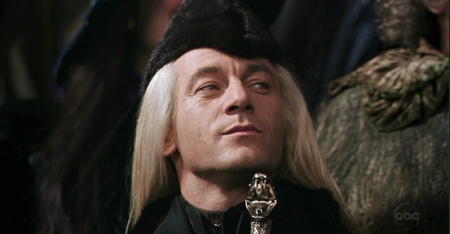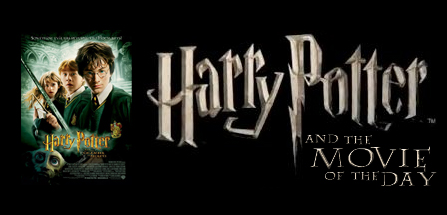
The Film: Harry Potter and the Chamber of Secrets (2002)
The Premise: It’s Harry’s second year at Hogwarts School of Witchcraft and Wizardry. Considering he met He-Who-Shall-Not-Be-Named in his very first year, and discovered that Voldemort was in fact alive and kicking, can he possibly have a quiet and uneventful year? Of course not. He’s the Boy Who Lived.
Harry’s crazy term begins before he even sets foot on Hogwarts grounds, though. A house-elf named Dobby appears in his bedroom, and insists he must not go back to Hogwarts. Harry can’t even consider that idea though — especially not after Dobby drops a cake on the Dursley’s important guests, which ensures Harry is beaten, starved, and locked up again. Luckily, the Weasleys show up to break him out, and Harry heads off to Diagon Alley, ready to stock up on chocolate frogs and textbooks in order to begin a new term.
But all is not well in the halls of Hogwarts. Something evil is stalking the halls, targeting Mudbloods and turning them to stone. Bloody messages appear on the walls, insisting the mysterious Chamber of Secrets has been opened. Who is behind the attacks? Draco Malfoy or his snide father, Lucius? The new dandy professor, Gilderoy Lockhart? Or is it Voldemort, who Harry knows is lurking out in the world, drunk on unicorn blood?
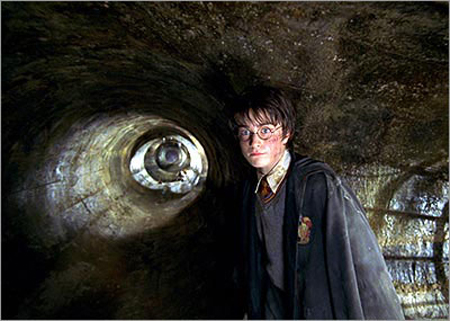
Is It Good: It’s the least popular of the series, and many hold it up as proof that Chris Columbus was a near disaster for the franchise. But I think it’s been unfairly maligned. Many of its faults lie with the source material itself, and many of its positives are things Columbus actually brought to the table.
Columbus had a very thankless task — he had to world-build, and he had to do so from the least exciting and compelling books. It’s easy to praise Alfonso Cuaron, Mike Newell and David Yates for what they did with the material, but they got to come in and play in an already established world, with a fanbase that was already hooked. By Prisoner of Azkaban and Goblet of Fire, fans were breathing easier, and recognizing that the books and the movies could be their own thing.
For what it is, I think it’s good. Could it have been paced better and spiced up? Probably. Undoubtedly. But the cast was young, the story was still innocent, and without following the pattern J.K. Rowling set (the obligatory Quidditch match and Christmas sequence) there wouldn’t have been much of a movie. We were still a ways out from being able to insert a scene set to Nick Cave, you know?
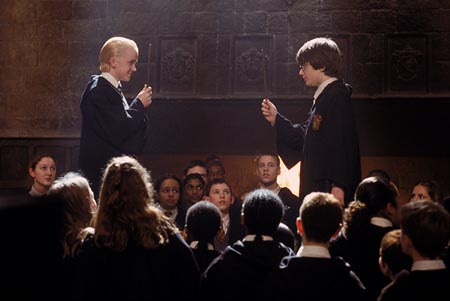
Is It Worth A Look: It is. For awhile there, it looked like Chambers was a throwaway chapter in Rowling’s series. None of the books ever referred back to it the way they did with Azkaban, which brought in characters and concepts that really had an impact on the series. But then, wham! It turned out Chambers was an enormous tip-off to Half-Blood Prince and Deathly Hallows, with this memory-of-Tom-Riddle thing being the clue to bringing Voldemort down. The diary wasn’t just a cheesy MacGuffin. It was a Horcrux. It was a piece of Voldemort’s soul, and in destroying it, Harry struck his first real blow at the Dark Lord. (The basilisk venom also comes back into the final book as a great way to destroy other Horcruxes. If I ever doubted Rowling didn’t have it all plotted from day one — and if you heard me back in like, 2004, I was adamant she didn’t — that shot my fears to pieces.)
Chambers also holds a special place in my Potter fandom for one reason: Jason Isaacs as Lucius Malfoy, arguably one of the biggest standouts in a cast full of bright supporting stars. I’m not sure the film needs any flair beyond the flare of his disapproving, racist nostrils. Every scene he’s in is just a delight.
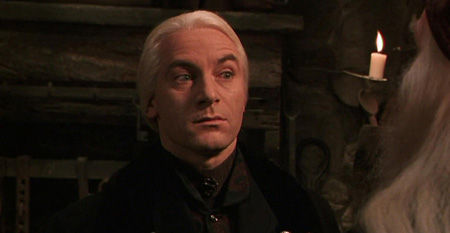
Kenneth Branagh as Gilderoy Lockhart was also a stroke of genius. Again, the first two films were considered such kid’s fare that it was still sort of astonishing to see so many sirs and dames of English stage and screen sign on to play. I can’t say that Branagh legitimized it (I’d give that to Alan Rickman, Richard Harris and Maggie Smith) but I’d like to think the visible fun he was having helped encourage others to sign on. After Branagh, it became popular to be in the Potter films. And you have to hand it to the guy — he knows very well he’s poking fun at his bombastic, Shakespeare-wrote-for-me reputation, and that takes a special sense of humor. It’s a shame the script never had time to bring him back in for a cameo.
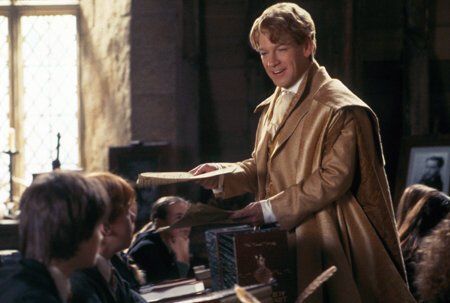
For Isaacs and Branagh alone, it’s worth a watch. Story-wise, it really does need to be regarded more kindly. (Again, it’s the first Horcrux!!) It’s easy to point fingers and sneer at Columbus, but come on, he only got a basilisk and a face under a turban to play with. The other guys got all the gloom, doom, and sexual awakenings. For doing the hard work (assembling the majority of a truly wonderful cast, and for making Hogwarts look exactly as it ought to) he deserves a round of applause.
I’m happy to give it to him just for bringing Isaacs in. The Death Eaters would be sorely diminished without that icy sneer.
